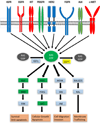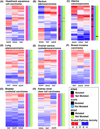The value of genomics in dissecting the RAS-network and in guiding therapeutics for RAS-driven cancers
- PMID: 27338857
- PMCID: PMC5951171
- DOI: 10.1016/j.semcdb.2016.06.012
The value of genomics in dissecting the RAS-network and in guiding therapeutics for RAS-driven cancers
Abstract
The rise in genomic knowledge over the past decade has revealed the molecular etiology of many diseases, and has identified intricate signaling network activity in human cancers. Genomics provides the opportunity to determine genome structure and capture the activity of thousands of molecular events concurrently, which is important for deciphering highly complex genetic diseases such as cancer. In this review, we focus on genomic efforts directed towards one of cancer's most frequently mutated networks, the RAS pathway. Genomic tools such as gene expression signatures and assessment of mutations across the RAS network enable the capture of RAS signaling complexity. Due to this high level of interaction and cross-talk within the network, efforts to target RAS signaling in the clinic have generally failed, and we currently lack the ability to directly inhibit the RAS protein with high efficacy. We propose that the use of gene expression data can identify effective treatments that broadly inhibit the RAS network as this approach measures pathway activity independent of mutation status or any single mechanism of activation. Here, we review the genomic studies that map the complexity of the RAS network in cancer, and that show how genomic measurements of RAS pathway activation can identify effective RAS inhibition strategies. We also address the challenges and future directions for treating RAS-driven tumors. In summary, genomic assessment of RAS signaling provides a level of complexity necessary to accurately map the network that matches the intricacy of RAS pathway interactions in cancer.
Keywords: Cancer; Gene expression signature; Genomics; RAS; Targeted therapy.
Copyright © 2016 The Authors. Published by Elsevier Ltd.. All rights reserved.
Figures


References
-
- Lander ES, Linton LM, Birren B, Nusbaum C, Zody MC, Baldwin J, et al. International Human Genome Sequencing, Initial sequencing and analysis of the human genome. Nature. 2001;409:860–921. - PubMed
-
- Garman KS, Nevins JR, Potti A. Genomic strategies for personalized cancer therapy. Hum. Mol. Genet. 2007;16(Spec No) - PubMed
-
- Chin L, Andersen JN, Futreal PA. Cancer genomics: from discovery science to personalized medicine. Nat. Med. 2011;17:297–303. - PubMed
-
- Balmain A, Gray J, Ponder B. The genetics and genomics of cancer. Nat. Genet. 2003;33(Suppl):238–244. - PubMed
Publication types
MeSH terms
Substances
Grants and funding
LinkOut - more resources
Full Text Sources
Other Literature Sources
Miscellaneous

